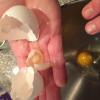Short Clip About Disability
By portraits3November 25, 2016 - 00:07

"Best ad ever - Ignorance of the ability brings disability"
Serendip is an independent site partnering with faculty at multiple colleges and universities around the world. Happy exploring!

"Best ad ever - Ignorance of the ability brings disability"

After bringing the complex debate over growing genetically modified potatoes to life, Ruth Ozeki’s novel All Over Creation closes with a technicality, albeit a crucial one. Will Quinn, an Idaho potato farmer weighing the benefits of growing genetically engineered NuLife potatoes over traditional spurs, considers leaving potatoes all together and shifting to organic hay. For most farmer’s like Will, it comes down to growing whatever will make a living. Regardless of the potential reduction in needed chemical inputs or the possible health and environment threats that are tied to the GMO debate in the story, Will has no choice but to follow the consumers’ demand to get by:

I started reading A Country Called Prison: Mass incarceration and the Making of a New Nation by Mary D. Looman, John D. Carl. I plan on reading 90 pages for each Tuesday and 90 pages for each Thursday. At this rate, I plan on finishing the book by December 6th. I plan on writing a posting every Tuesday and Thursday about what I’ve read. This posting will describe a part of the reading I found interesting as well as connect it to other readings, discussions, or ideas we’ve had in these three classes or others that I find relevant. I am also going to write a paper analyzing how hair is used, described, and its many significations in Americanah, which I will turn in on December 16th.

so im focusing on David Marriott's On Black Men, and it is such a difficult book to read. I don't know if this is the class/time to focus on this work specifically, but i'm trying to read things im immediately drawn to. i thought i might bring back a book of poetry, Brutal Imagination by Cornelius Eady too. I read the book over the summer and included it in the archive. it's a crushing 128 pgs. really deeply connected to the theory of Marriott. i have to get my hands on brutal imagination and look again so more to come. but in the meantime, a bit from marriott on richard wright, photography and lynching:

I am working with Americanah, which I am about halfway through reading. I am focusing on the characters' (especially Ifemelu's) experiences as immigrants, struggling to belong in a new country, but also not fitting in if they return home. For instance, I might think about different characters' use of language. Ifemelu at first looks down on American English, but picks up some expressions unconsciously and spends several years intentionally cultivating an American accent, which she then abandons because she realizes that she doesn't want to sound American. Her speech is still different, though: When she runs into Kayode, she says that they "[lapse] into their Nigerian voices" (p. 276).

Moving forward for our English class, I would like to read Their Eyes Were Watching God by Zora Neale Hurston. It is a book that has been on my mind for a long time, even though I don't know anything about it really. I've also been thinking about Zora Neale Hurston from our conversations with Monique about anthropology since Hurston herself was an anthropologist. As I was talking about my choice with some classmates today, Creighton offered to lend me her copy and told me about how much this book meant to her.

my original plan had been to further explore haunting but i've decided that i don't have enough time to really delve into it the way i'd like to. i've decided instead to focus on the color purple and it's different adaptations. i'm not sure exactly where i'm going with it, but this is the text i'm going to work with. my next post will go more in depth about my plan moving forward - i've been having a bit of a hard time with the lack of structure/guidlines/planning time in this independent study.

what are groups doing?
group 1: ere ibeji (yoruban)
group 2: nikisi nkondi (congo)
group 3: edan ogboni (yoruban, nigeria)
group 4: door (yoruban, nigeria) and housepost (yoruban, nigeria)
group 5: fertility figure (yoruban) and ritual spoon (dom region, liberia)
themes of the objects?
group 4: boundaries between public and private, with a focus on the home and its deconstruction/reconstruction through museum exhibitions

There is this an belief in the earth that humans supercede other species; that we have control over everything, because we can use just about every other species in some way to advance ourselves. We find use in everything, and therefore we think of them as below us. The only thing stronger than human force is nature and the weather - which we forget. We try to control the weather, we try to control nature. But in the end, we belong to the earth, we belong to nature, and our use of resources does not render us stronger than the resources we use.

I partly agree with Bdragon's Western Civilization flaws. As Bdragon agrees with Society in denial, I also believe that one of the main problems of human beings in response to the environment issue is that we always refuse to face it. But as I read the sentence "If the whole Western Civilization came together just like the animals did with the girl, we would be able to overcome climate change." I start to wonder, how could that be possible?